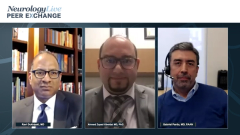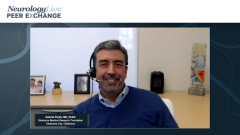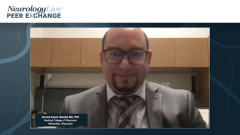
The Future of RRMS Treatment
Expert neurologists highlight upcoming agents for the treatment of RRMS, focusing on biomarkers.
Episodes in this series

Ahmed Zayed Obeidat MD, PhD: We spoke about genetics, we had a great discussion. In the last few minutes or so we’ll talk about the future directions of multiple sclerosis [MS]. The pipeline is very exciting. There are new drugs with new mechanisms of action. There are some drugs that are being repurposed for MS for neuroprotection, remyelination. Dr Dukkipati, can you talk about what would be 1 agent or 1 class of agents that you’re most excited about from the pipeline?
Ravi Dukkipati, MD: I think to your point, there are several drugs in the pipeline for let’s say the next 12 to 18 months and beyond. I think the most exciting one that’s on our minds is the class of the BTK inhibitors, Bruton tyrosine kinase inhibitors, because they represent a novel mechanism. We talked earlier this evening about progression independent of relapses and smoldering disease. What the BTKis potentially represent is a class of medications where innate immunity, microglia, and such can be acted upon with the hopes of slowing progression. To your point, there are several that are in phase 3, and others that are in phase 2 development. I think in the next 12 to 18 months, we should hopefully see the launch of some of these drugs.
Ahmed Zayed Obeidat MD, PhD: Dr Pardo, what do you think about the race for BTKis?
Gabriel Pardo, MD, FAAN: It’s on, right? The race is on. We know a couple of them are in phase 3 trials. They have concluded recruitment, and we hope to see results in the near future, hopefully by the fall. That’s our expectation, and hopefully that will be the case. There are a lot of high hopes that this class of therapies will add another layer to our ability to treat our patients. As has just been mentioned, they might have this effect on the residing innate immune system within the CNS [central nervous system] and the microglia. If so, we might then have a better chance of controlling that progression independent of relapse, that smoldering inflammation, and we’ll have to then look at the results and see if that’s the case, while they still are having an effect on the peripheral immune system like conventional medications have been doing. That’s the added layer that they have. The expectation is high. Hopefully, the results will hold up and allow us to then add that layer of complexity to the treatment of our patients.
Ahmed Zayed Obeidat MD, PhD: I will use the first sentence you used earlier today; these potentially are going to affect both components of the disease, the progressive component and the relapsing component.
Ravi Dukkipati, MD: And the inflammatory.
Ahmed Zayed Obeidat MD, PhD: The inflammatory component, which will be interesting to see whether that’s going to hold and what the data are going to show, and hopefully with good safety because we know the off-target effects can be of concern with this class of medication. Hopefully we’ll have good enough safety to be able to deliver those medications to people who need those to help change the outlook of MS in the future. There are some other interesting molecules. Metformin always intrigues me. When I see someone is on metformin, I encourage them to stay on it because that may also help their MS symptoms.
One of the things about it is metformin has the ability to rejuvenate. In the preclinical data in laboratory rats, when that medication is given to let’s say the rodent, looking at oligodendrocytes, you can see those oligodendrocytes can rejuvenate their ability to remyelinate. There are a few clinical trials going on in humans to look at metformin as a rejuvenating or a pro-remyelinating agent. I still don’t know if the dosing is enough because they needed to use a high dose to be able to introduce that effect in the animal model. I don’t know how it’s going to translate to human studies. Any thoughts about it? Dr Pardo, I see you’re nodding your head.
Gabriel Pardo, MD, FAAN: Yes, there is a lot of buzz about metformin, not only in the area of neurology, but in general about longevity and even in muscular health long term, with the immunosenescence process and aging in general of the different organs and how it might be beneficial. There are data in that regard that are being built, and hopefully it will prove to be beneficial, but again time will tell. Another old agent, old molecule, that might have the potential for inducing remyelination is clemastine, an old antihistamine medication that is being looked at. The dosages, and it perhaps needs to be used in combination with other agents, we’ll see how that pans out, but all of that is very exciting.
I think the other aspect of things that are being worked on has to do with the Epstein-Barr virus [EBV]. We have had very good data, 2 very well-conducted studies published last year, that are giving us high confidence in the belief that indeed the Epstein-Barr virus is at least the trigger of the process that causes the late autoimmunity that we know as MS. There are different approaches we could consider, but the first thing is, could we eradicate MS if we eliminate Epstein-Barr virus through a vaccine? That is being looked at, vaccines for Epstein-Barr virus are being developed. It will take generations to demonstrate that, so it’s going to be difficult for us in our lifetime perhaps to know if a vaccine that can prevent the Epstein-Barr virus will eradicate MS. It’s theoretically, a bit of pie in the sky, but possible.
More importantly, does the presence of the Epstein-Barr virus perpetuate the inflammation and is not just the trigger? And if so, are there approaches that can modify that? Like T-cell therapy, can we specifically target the T cells that are laden with the virus and consequently destroy the virus? Can we use antiviral agents that we do not have at this time against the Epstein-Barr virus and modify that? Can we have reverse vaccines that would alter the response to the Epstein-Barr virus as adults? All of those are very interesting approaches that are not far out and might give us a different way to approach MS and the late consequences of the disease.
Ahmed Zayed Obeidat MD, PhD: I couldn’t agree more. The excitement around EBV-targeted therapy is definitely in the early stages but very promising for MS, including the progressive component of the disease. If EBV is driving that progression in MS and the inflammatory component of the progression, it’s something to think about. EBV-specific T cells targeting those EBV-infected B cells are another component that we’re very excited to learn about with the results of the phase 2 trial that is being concluded on that topic. Dr Dukkipati, do you have any additional thoughts on the future of treatments or even biomarkers that may be coming to clinical practice in the near future in MS?
Ravi Dukkipati, MD: Yes, I think there are a lot of exciting things. It’s just a matter of getting the appropriate data. When it comes to biomarkers, we need normative data, we need standardized data. We need to have frames of reference so that we can utilize these in day-to-day practice effectively, and we all welcome that.
Ahmed Zayed Obeidat MD, PhD: Perfect, and I think there’s more to come in MS care and all the biomarkers and new therapies. One of these interesting ones is NfL [neurofilament light chain] and GFAP, and the relation to cognition in MS, which has been most recently presented. There may be some relation between NfL and cognitive function, and that’s another big unmet need in MS.
We talked about some unmet needs, but cognitive difficulties that can accompany MS, those are some of the big unmet needs that we can’t do much yet about. When my patients ask me, “What can we do with my memory difficulties, my attention difficulties?” I sometimes say to them, “We know cognitive behavioral therapy may work, we know aquatic therapy may work, we know exercise, diet may work, but we don’t have strong data on slowing cognitive difficulties in MS or cognitive processing difficulties.” Any words on cognition and MS from that aspect?
Gabriel Pardo, MD, FAAN: I think it goes back to prevention. We need to preserve the brain, we need to preserve the function. When it’s lost, it’s very difficult to bring back, and cognition, it’s the one that we have not conquered at any level in neurology. We don’t have much that we can offer any of the neurodegenerative diseases that have an effect on cognition long term, so prevention is the name. We have the ability to do so, and has been mentioned several times today, this process of damage to the brain and persistent inflammatory activity in the background happen from the get-go. The neurodegeneration happens from the get-go. We can impact it much more significantly if we start highly effective or effective therapies for those patients very early.
I think the emphasis on early diagnosis and aggressive therapy early, and perhaps de-escalating, which is another point we didn’t talk about is crucial. We can start with these high-efficacy medications, assuming a bit of a higher safety concern as we age. Can we then de-escalate and modify that? I think that will end up being our best approach because we control the disease when it’s most aggressive, when it has the most inflammation, more potential for tissue damage. As we assume some safety issues as we age and we bring other things to the fold, then we can start going down on our agents or just modify the approach altogether.
Transcript edited for clarity
Newsletter
Keep your finger on the pulse of neurology—subscribe to NeurologyLive for expert interviews, new data, and breakthrough treatment updates.














